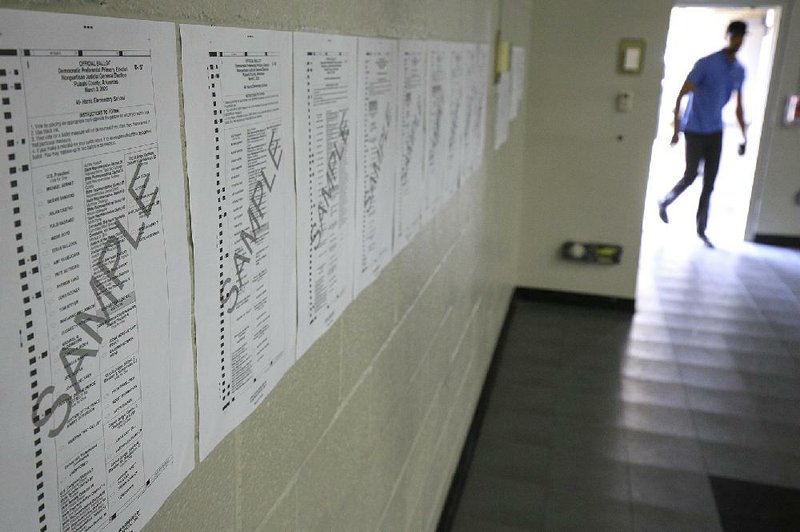Independent candidates asked Gov. Asa Hutchinson to reduce the signature threshold that they must obtain on petitions to qualify for the November ballot, noting hardships arising from his covid-19 public health emergency declaration.
More than two weeks after sending letters by certified and registered mail, they're still waiting for an answer, according to Dan Whitfield, an independent U.S. Senate candidate from Bella Vista.
"We haven't gotten any response at all. No mail, no emails, no phone call. They basically pretended like they didn't get the letter at all," he said.
With the May 1 deadline approaching and Hutchinson's public health emergency declaration still in place, they've hired a attorney in an attempt to gain ballot access.
James Linger of Tulsa has successfully challenged Arkansas' election laws before, representing the Libertarian Party of Arkansas as it sought access to the state ballot.
He's preparing to challenge them again, he said in a telephone interview Tuesday.
"There will be a lawsuit filed, yes," Linger said.
The six independent candidates who wrote to Hutchinson are "doing the best they can" in the midst of a global pandemic, he said.
"This is a bad situation and it has adversely affected them," he said.
"Sporting events, church events, civic events, shopping centers, courthouses, [places] where normally you'd have large numbers of people gathering, they're not gathering right now. Even if you approach people, you know, you'll have a very negative reaction," he said.
Hutchinson declined Tuesday to comment on the independent candidates' request.
"The Governor has received the letter and has asked his legal counsel to review it," his spokeswoman, Katie Beck, wrote in a text message.
In order to gain ballot access in Arkansas, independent candidates must submit signatures from at least 3% of the number of voters who participated in the 2018 gubernatorial election in the district for which they are running, but no more than 10,000 signatures. In the 2018 gubernatorial election, 891,509 people voted; 3% would be 26,745 for a statewide office, but the maximum required is 10,000.
They must all be collected within a 90-day window; otherwise they are invalid.
Whitfield, who is challenging Republican U.S. Sen. Tom Cotton, said his signature gathering was going great until the March 11 public health emergency was declared.
With the Democratic candidate for U.S. Senate withdrawing from the race, Whitfield has attempted to portray himself as a progressive alternative to the conservative incumbent.
More than 500 names were collected at just one event -- a Feb. 29 rally for U.S. Sen. Elizabeth Warren, D-Mass.
Since then, mass gatherings have been canceled. Asking for signatures is a challenge if you can't come within six feet of them, he noted.
Despite the restrictions, he's still gathering signatures. Visitors to his website, replacetomcotton.com, are encouraged to "print, sign and send in," their own petition forms.
The sheet must be printed on legal-size paper and the information must be printed in black ink, the website notes.
"I have about 5,200 [signatures] that I've counted, but I've got another 100 envelopes sitting here on the front porch in a bag that I haven't gotten to disinfect ... yet, so I should have a few more," he said.
While striving to reach the 10,000-signature mark, he's hopeful that state officials will provide some kind of accommodation.
Ballot access lawsuits have already been filed in other states since the covid-19 pandemic began.
In March, Republican U.S. Senate candidate Omari Faulkner convinced a Virginia judge to lower the threshold there from 10,000 signatures to 3,500. Unable to qualify despite the modification, Faulkner eventually ended his campaign.
Earlier this month, three candidates in Massachusetts challenged that state's signature requirements. In legal filings, they portrayed the signature burden there as "unconstitutionally severe."
In Michigan, a Republican candidate for Congress successfully challenged that state's signature requirements.
Noting the governor's stay-at-home order, U.S. District Judge Terrence Berg wrote Monday: "Since March 23, 2020, traditional door-to-door signature collecting has become a misdemeanor offense."
The state-imposed restrictions on movement and the state-mandated signature requirements "operate in tandem to impose a severe burden on plaintiff's ability to seek elected office," Berg said.
He gave Michigan candidates an additional 17 days to gather signatures.
Back in Arkansas, Whitfield has asked the secretary of state's office to help him fix the problem. They referred him to the governor's office.
"We can't alter the law. ... We don't have the authority to change the requirements," said Chris Powell, a spokesman for Secretary of State John Thurston.
The Democratic Party of Arkansas has also declined to lend its support.
Among party activists, opinion was split on whether to rally behind Whitfield's candidacy, according to Democratic Party of Arkansas Chairman Michael John Gray.
"I've heard from a lot of members in the party that encouraged us to endorse him, to back him, to politically come out for him. And there were members of the party that said, 'If he wanted the support of the Democratic Party, then he could have filed as a Democrat,'" Gray said.
The party's executive committee ultimately "overwhelmingly made the decision" not to support Whitfield's candidacy, Gray added.
Information for this article was contributed by Hunter Field and Michael R. Wickline of the Arkansas Democrat-Gazette and Doug Thompson of the Northwest Arkansas Democrat-Gazette.
Metro on 04/22/2020
